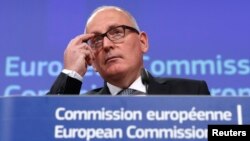The European Union began an unprecedented inquiry on Wednesday into whether Poland's new conservative, Eurosceptic government has breached the EU's democratic standards by taking more control of the judiciary and public media.
The first use of the EU executive's new Rule of Law Framework could in principle eventually lead to sanctions such as the suspension of Poland's voting rights. But the main impact now may be to further sour relations among EU member governments already strained by multiple crises and mounting nationalism.
"The European Commission does not wish to put into question any of the democratic choices made by the Polish people," its deputy head, Frans Timmermans, wrote to the Polish justice minister in a letter on Wednesday that was seen by Reuters.
"However, the European Union is founded on a common set of values ... which include in particular the respect for the rule of law," he added. "There can be no democracy and respect for fundamental rights without respect for the rule of law."
The decision, by consensus, followed intense debate at the weekly meeting of the European Commission. Its 28 members, one from each EU state, weighed whether to continue informal talks with Warsaw or launch a formal confrontation which might harden attitudes within Jaroslaw Kaczynski's ruling Law and Justice (PiS) party.
Commission President Jean-Claude Juncker has said it should not be seen to be "bashing Poland" and officials had indicated the executive might hold off on triggering a formal review.
But diplomats said Warsaw did itself no favors in Brussels by its combative reactions ahead of the Commission debate.
One key minister dismissed criticism from EU powerhouse Berlin as "silly" and reminded Germans of their World War Two crimes in Poland, while a pro-government magazine depicted Chancellor Angela Merkel as Hitler on its cover, and Juncker as a Nazi general.
Timmermans, who has responsibility for human rights on the executive, pushed his colleagues hard to launch the procedure, sources familiar with the meeting told Reuters. The Dutchman promoted the mechanism when he was foreign minister in The Hague in 2014 as a response to criticism the EU had failed to curb authoritarian measures by Hungarian Prime Minister Viktor Orban.
Warsaw Unfazed
The Polish government played down the Commission's move. A spokesman called it "standard procedure" and a "fact-finding operation by the European Commission on the basis of some speculation that has surfaced in western Europe."
Deputy Foreign Minister Konrad Szymanski, visiting the European Parliament, said: "We are ready for dialogue."
Foreign Minister Witold Waszczykowski told Reuters he found Timmermans' statements "contradictory," however, and Szymanski said the EU risked "taking sides" against PiS in Polish politics following its election victory in October.
Timmermans said the Rule of Law Framework would usher in a "structured dialogue" with Warsaw. He and the Commission would review Polish responses by mid-March, after working with the Council of Europe, the pan-European human rights watchdog.
Critics accuse Kaczynski and his party ally Prime Minister Beata Szydlo of rolling back judicial independence and freedom of speech. Supporters say the government is entitled to uphold Catholic and national values, independent of Brussels.
PiS has packed the constitutional court with its appointees and changed the court's voting system, curbing its ability to censure legislation. It has also passed a law giving the government direct control over the appointment of public media chiefs.
The procedure pits the Commission against by far the biggest of the ex-Communist eastern states that joined the EU a decade ago. Poland's seat on the Commission is held by a former minister in the previous, pro-European, center-right government.
The row comes at a time when the Union may be more divided than at any time in its six-decade history, including between east and west and rich and poor states, over a variety of major crises, including how to handle a big influx of Syrian refugees.
Several eastern leaders have cited popular rejection of Muslims to justify opposing efforts by Brussels and Berlin to force all EU states to take in quotas of asylum-seekers.
Senior EU officials have noted that, unlike Orban in Hungary, the Polish government has already faced substantial domestic protest at its actions, including demonstrations.
Penalizing a state for a "serious breach of (EU) values" under Article 7 of the EU treaty by, among other things, suspending its right to vote in EU councils is a "nuclear option" that has so far never been used. Juncker says it is unlikely to be applied against Poland, which leaves the bloc with few means except persuasion.
Orban has already said he would veto sanctions — a move that would in any case be considered only after a process under which the Commission can recommend changes to national legislation and then wait to see if they are implemented.










